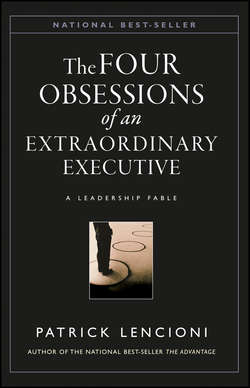Читать книгу The Four Obsessions of an Extraordinary Executive - Patrick M. Lencioni - Страница 8
На сайте Литреса книга снята с продажи.
PART TWO
The History
ОглавлениеTWO CEOS
In many ways, Rich O’Connor and Vince Green were alike. Besides being CEOs of the area’s top technical consulting firms, they were essentially likable and decent men. Both were tireless workers, fierce competitors, and committed husbands and fathers.
They also happened to receive their training at U.C. Berkeley’s business school at the same time. Vince had worked with a top management consulting firm before B-school. During his two years at Berkeley, he followed the stock market religiously, maintained contact with business associates, and read as many analyst reports as he could get his hands on. He graduated near the top of his class.
Rich also earned impressive grades but maintained a relatively low profile in the process. To earn extra cash, he waited tables and tutored undergraduate students, and when he wasn’t working or in class, he could be found at the psychology lab where his wife-to-be worked. Because Rich spent so much time away from the business school, he didn’t establish quite as many close relationships with classmates as most others did.
When Vince decided to start his own consulting firm just a few years out of school, no one was surprised. When Rich did the same thing two months later, no one noticed.
The timing for getting into technical consulting was ideal, and for their first three years in business, both firms grew dramatically. Each CEO believed his success was the result of extremely hard work, a little luck, and amazing attention to detail within his respective firm.
Both of them received regular reports about virtually every consulting engagement that their firms took on. They knew where every dollar was being spent, how much every client owed, and which competitors were bidding on which projects.
During this time Rich and Vince developed a cordial though somewhat distant relationship. Although the two rivals respected one another, they also knew that the other would be glad to take his business away from him if he lost his edge. So they were determined to never lose their edge.
Neither firm established any discernible advantage over the other, and they shared much of the emerging local spotlight when it came to consulting. Vince liked to say that their companies maintained a degree of balance that made coexistence possible, even enjoyable.
Until something changed.
Out of nowhere, Telegraph seemed to gain an advantage over its rival. Before he knew what was happening, Vince found himself increasingly frustrated by his firm’s inability to compete with Telegraph on a variety of issues. What he didn’t understand at the time was that in spite of all their similarities, he and Rich O’Connor had suddenly become quite different CEOs.
DESPERATE EPIPHANY
It happened late one night while Rich sat alone in his home office, contemplating selling his beloved three-year-old company.
He was about to break under the pressure of trying to balance his family and his successful but demanding business. It seemed that with every passing month, there was more to know – competitive analysis, technology advancements, industry trends, client updates – and less time to learn about it all. But Rich prided himself on knowing his firm inside and out, and he always found a way to stay on top of what was going on at Telegraph.
It was when he missed his third consecutive Little League game that things began to unravel. He and his wife had begun to lose patience with his increasingly unmanageable schedule, and as hard as he tried, Rich could see no relief in sight. Selling the firm and taking on a less demanding job seemed like the only way to alleviate the pressure on him and his family.
But the company had become such a part of Rich’s life that he was unable to pull the trigger on a sale. So he decided to try an experiment. For three months he would quietly limit himself to fifty-hour workweeks – far below his usual seventy – which would give Rich plenty of time for his family. At the end of the experiment, if the firm were showing any signs of distress, he would sell.
For the first month he struggled, often bringing work home with him in violation of his personal pact. Trying desperately to handle the same set of responsibilities in less time, Rich only seemed to be falling further behind. Both his family and his staff were equally unhappy with the change, one that they really didn’t understand.
Then, during another long and painful night in his home office, Rich made a decision that would change his career, his company, and his life forever.
On the verge of resigning himself to giving up the firm, he decided to make one final, desperate attempt at success. Instead of scouring his schedule each week in search of activities that he could eliminate, Rich decided to turn the nature of his inquiry upside down. He wrote a simple question on a piece of paper:
WHAT IS THE ONE THING I DO THAT REALLY MATTERS TO THE FIRM?
Rich stared at the question for almost an hour. Nothing came to him.
Конец ознакомительного фрагмента. Купить книгу
